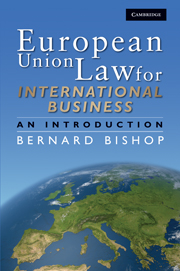Book contents
- Frontmatter
- Contents
- List of figures and tables
- List of case studies
- Preface
- Acknowledgements
- List of abbreviations
- Chapter 1 EU institutions and law making
- Chapter 2 Contracts for the sale of goods to an EU buyer
- Chapter 3 Transport of goods to an EU buyer
- Chapter 4 Customs law and procedure within the EU
- Chapter 5 Payment and risk management in international sales
- Chapter 6 Sales to the EU using an EU representative
- Chapter 7 Entering the EU market via franchising arrangements
- Chapter 8 Establishing a permanent presence in the EU
- Chapter 9 Resolving a dispute with an EU firm
- Index
- References
Chapter 6 - Sales to the EU using an EU representative
Published online by Cambridge University Press: 05 June 2012
- Frontmatter
- Contents
- List of figures and tables
- List of case studies
- Preface
- Acknowledgements
- List of abbreviations
- Chapter 1 EU institutions and law making
- Chapter 2 Contracts for the sale of goods to an EU buyer
- Chapter 3 Transport of goods to an EU buyer
- Chapter 4 Customs law and procedure within the EU
- Chapter 5 Payment and risk management in international sales
- Chapter 6 Sales to the EU using an EU representative
- Chapter 7 Entering the EU market via franchising arrangements
- Chapter 8 Establishing a permanent presence in the EU
- Chapter 9 Resolving a dispute with an EU firm
- Index
- References
Summary
INTRODUCTION
Many firms exporting goods to the EU find it beneficial to have a representative in one or more of its member countries. How many representatives and where they are located will depend upon the market that the exporter has found for its goods. The most common types of representative are agents and distributors. Agents act on behalf of the exporter to find customers for the goods or services being sold. Those customers then contract directly with the exporter as in a direct export transaction. The agent receives a commission for having found the customer and carrying out other duties that the agreement between the agent and the exporter might specify. Distributors, on the other hand, buy directly from the exporter and then on-sell to end customers. Because there is a long-term relationship between the exporter and the distributor, there is often a master agreement between them setting out the obligations of each and usually the terms of sale for the ongoing shipments of goods.
It should now be apparent that all of the issues covered in the previous chapters relating to contract terms, delivery obligations, transport, customs and payment when an exporter sells directly to a customer in an EU country will also be applicable in agency and distribution arrangements. In the case of agency, while the agent finds customers for the exporter, the agent will most often refer the customer on to the exporter for the final negotiation of the contract of sale.
- Type
- Chapter
- Information
- European Union Law for International BusinessAn Introduction, pp. 108 - 141Publisher: Cambridge University PressPrint publication year: 2009



